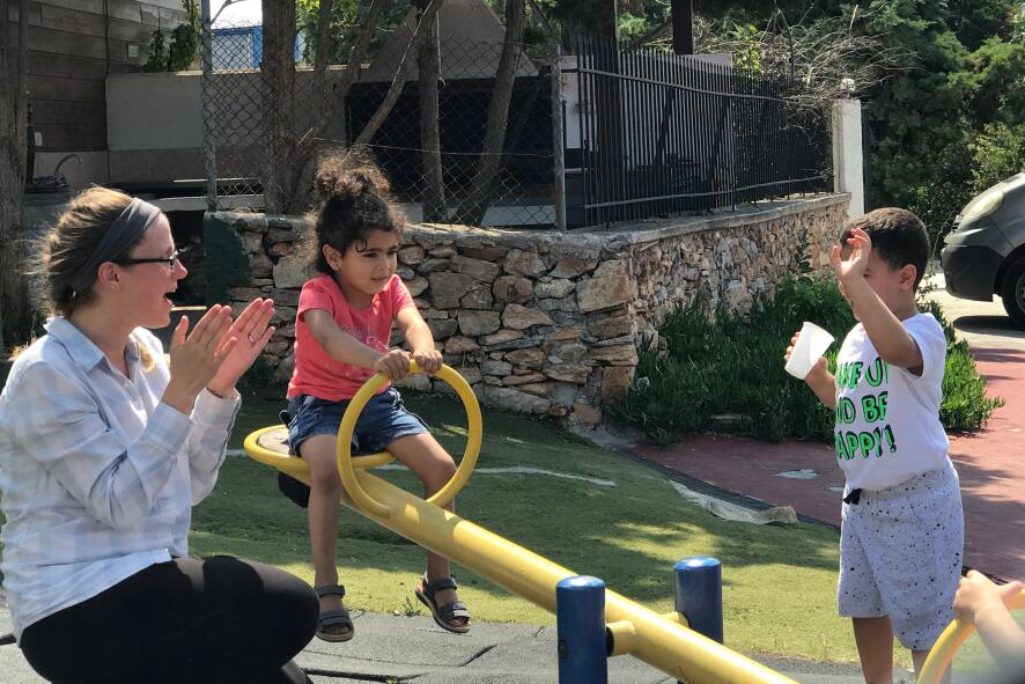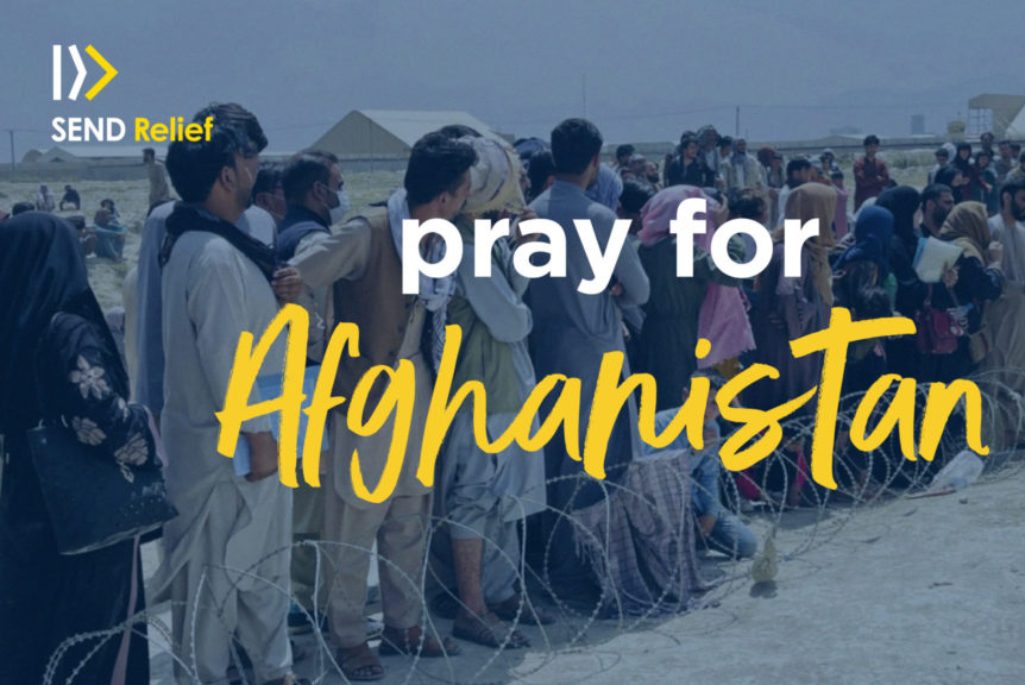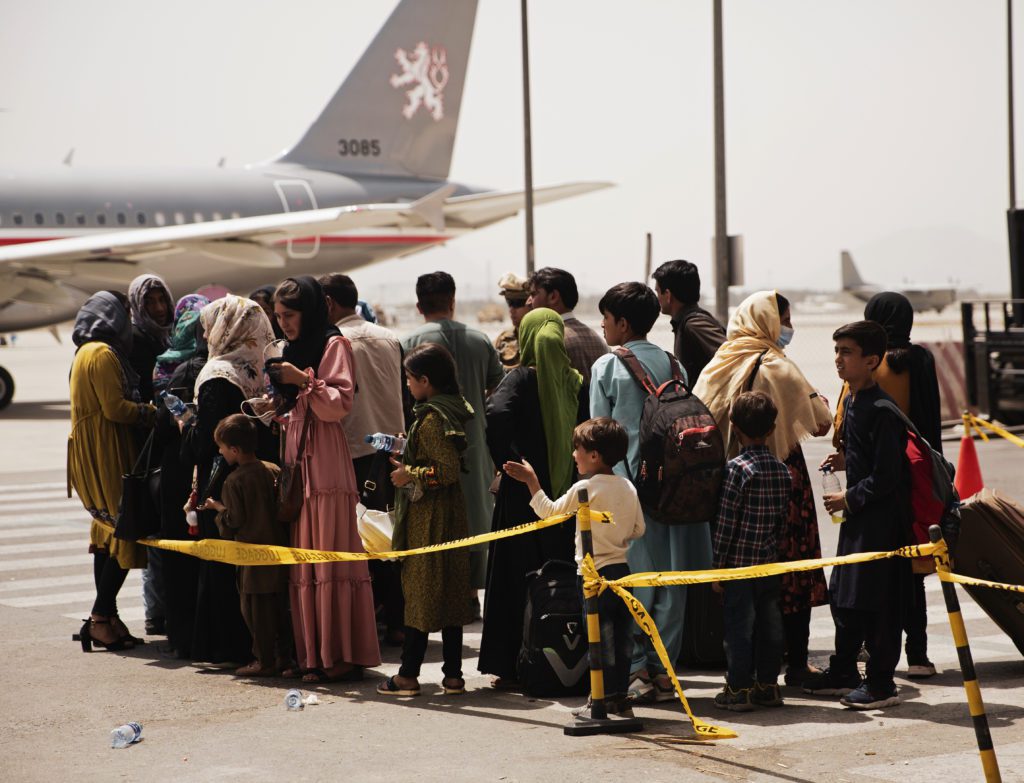
Ellen Hembree, wife of Impact FXBG pastor Brandon Hembree in Fredericksburg, Va., plays with Afghan children last year. A large number of Afghan refugees are expected to eventually join a sizable native population in northern Virginia.
Brandon Hembree remembers the moment Afghan refugees became a face instead of a number.
The face belonged to a child, frightened by the sound of planes overhead. The playground wasn’t in Afghanistan. It was in northern Virginia.
Hembree and others from Impact Church in Centerville, where he was pastor at the time, were playing soccer and games with the children. Such activities are vital for families with restless kids who need to burn off energy while adults jump through myriad bureaucratic hoops in a government office. But every time a plane from the nearby airport flew overhead, the games stopped and children ran for cover.
Every time.
“If my kids see a plane in the sky, they get my attention and say, ‘Look daddy, a plane!’” Hembree said. “For those children, it was a sign of war.
“It opened my eyes that we have lived in a completely different world from them. You see a piece of their crisis. When you hear their stories, it’s totally different than watching the news. You’re looking someone in the eye and holding their hands.”
It’s easy to get lost in the numbers. As of Sept. 14, according to the New York Times, about 64,000 Afghanis had fled their home country after the Taliban takeover and arrived in the United States. Nearly 49,000 are currently at eight military bases throughout the country. As many as 18,000 remain at U.S. bases overseas.
On Sept. 15, states were notified by the Biden administration as to how many refugees they are expected to receive from the first wave to arrive. Most will be sent to California (5,300) and Texas (4,500).
And as those refugees work through a legal process expected to take months to complete, Southern Baptists are among those groups preparing to assist both with the short-term as well as long-term needs. Those efforts are largely taking shape through state conventions and ministries geared toward disaster relief or missions as well as through Send Relief.
After processing, refugees are introduced to regions with a significant Afghan population. The area around Washington, D.C., including northern Virginia, holds one of the larger such communities in the nation.
Of the three Virginia military bases – Fort Lee, Fort Pickett and Quantico – where refugees are being processed, only Fort Pickett is currently allowing civilian volunteers, Southern Baptist Conservatives of Virginia Mobilization strategist Brad Russell said. Work with all three comes through a non-government organization or having a military sponsor on the base.
“We’re mobilizing our churches to serve and go for both short-term and long-term opportunities,” Russell said. “We’re being told it will take about two weeks to work through the paperwork process, but there are a lot of people going through the process.”
With food and shelter essentially covered, churches and other groups are being called upon to help provide programming such as games, soccer tournaments and arts and crafts for children and families on base. Hembree and Impact Church were doing that last year when he witnessed children running from the sound of a plane overhead. That ministry will continue at Impact FXBG in Fredericksburg, a sister church to Impact Centerville that Hembree planted earlier this year.
Donations are also part of the short-term response. Beyond that, churches can get involved in outreaches such as teaching English as a second language (ESL).
“Brandon and Impact Church have been training in ESL for the past couple of years and are now reaching into an established Afghani community,” Russell said.
The long-term investment being asked of churches comes at a time when refugee ministry has become more common and taken different forms. In recent years, said Kentucky Baptist Convention (KBC) Missions strategist John Barnett, KBC involvement with several resettlement groups in the Louisville area has grown.
“We’re looking for translators as well as churches who can help set up housing,” Barnett said. “Groups we’re calling ‘welcome teams’ or ‘co-journey teams’ will be Sunday School classes or any missional community group who will journey alongside a family or individual when they arrive and help them get set up.”
Groups will become instrumental in helping refugees accomplish tasks such as getting children registered for school, setting up doctor appointments and finding a job.
“The purpose is also to develop a genuine relationship so the body of Christ can be with them long term,” Barnett noted. “Who better to build community than in Christ?”
Other Southern Baptist churches across the country are participating by training to help resettle refugees or providing supplies such as hygiene kits. Clarkston International Bible Church near Atlanta, known for its refugee ministry, hosted a Sept. 10 workshop alongside Send Relief.
The Baptist State Convention of North Carolina is partnering with World Relief Durham to offer refugee/immigrant volunteer training this Thursday (Sept. 23) at Imago Dei Church in Raleigh.
Preparations also include areas of the country that in the past have not had a large number of refugees sent their way.
Ben Seamans is disaster relief catalyst for the Minnesota-Wisconsin Baptist Convention (MWBC), a role he fills on a bivocational basis while managing his construction business. Churches in his convention are ready to respond and currently assessing just how best to do that.
“We didn’t know what we didn’t know,” he said on preparing for the more than 12,700 refugees currently at Fort McCoy in Wisconsin. “Churches were asking to help even before refugees started arriving, but we didn’t know what those needs were.”
With the needs becoming clearer, actions from MWBC churches have mirrored responses to previous crises such as immigrants at the southern border or earthquake damage in Haiti. Namely, collections have begun for food, water, baby formula and personal hygiene items. Any donations of clothing, however, need to take Afghani culture into consideration.
“It’s about flexibility, grace and being ready to help whenever we get the green light to do so,” he said. “But it’s exciting to see all the churches pull together. We do that really well for a common mission like this.”
(EDITOR’S NOTE – Scott Barkley is national correspondent for Baptist Press.)


